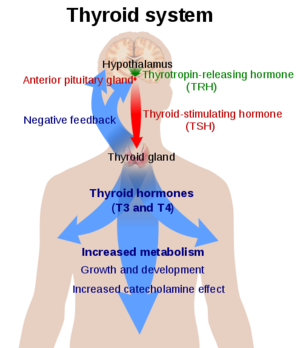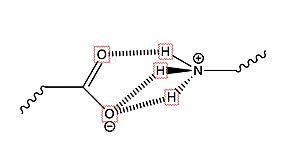Sandbox Reserved 1791
From Proteopedia
(Difference between revisions)
| Line 2: | Line 2: | ||
==Thyroid Stimulating Hormone Receptor (TSHR)== | ==Thyroid Stimulating Hormone Receptor (TSHR)== | ||
<StructureSection load='7xw5' size='400' side='right' caption='The Human Thyroid Stimulating Hormone Receptor and G protein complex' scene='95/952720/Tsh-tshr-gs_complex/1'> | <StructureSection load='7xw5' size='400' side='right' caption='The Human Thyroid Stimulating Hormone Receptor and G protein complex' scene='95/952720/Tsh-tshr-gs_complex/1'> | ||
| - | |||
== Introduction == | == Introduction == | ||
[[Image:Thyroid System.png|300 px|right|thumb|An overview of the Thyroid System source: [https://en.wikipedia.org/wiki/Thyroid_hormones Thyroid Hormones]]] | [[Image:Thyroid System.png|300 px|right|thumb|An overview of the Thyroid System source: [https://en.wikipedia.org/wiki/Thyroid_hormones Thyroid Hormones]]] | ||
| - | '''Thyroid Stimulating Hormone Receptor (TSHR)''' is a type of [https://proteopedia.org/wiki/index.php/GPCRs G-Protein Coupled Receptor (GPCR)] found in human thyroid follicles. It is activated by the [https://en.wikipedia.org/wiki/Thyroid-stimulating_hormone Thyroid Stimulating Hormone (TSH)] which is known as thyrotropin. Activation of TSHR is | + | '''Thyroid Stimulating Hormone Receptor (TSHR)''' is a type of [https://proteopedia.org/wiki/index.php/GPCRs G-Protein Coupled Receptor (GPCR)] found in human thyroid follicles. It is activated by the [https://en.wikipedia.org/wiki/Thyroid-stimulating_hormone Thyroid Stimulating Hormone (TSH)] which is known as thyrotropin. Activation of TSHR is necessary for activating a signaling pathway for the production of thyroid hormones such as [https://en.wikipedia.org/wiki/Triiodothyronine triiodothyronine(T<sub>3</sub>)] and [https://en.wikipedia.org/wiki/Thyroid_hormones thyroxine(T<sub>4</sub>)] |
== Structure== | == Structure== | ||
The structure of TSHR and the antibodies bound were found using [https://blue-scientific.com/cryo-em/ cyro-EM]. TSHR forms a complex with TSH and G<sub>s</sub> proteins. This is called the <scene name='95/952720/Tsh-tshr-gs_complex/1'>TSH-TSHR-G<sub>s</sub> Complex</scene>. | The structure of TSHR and the antibodies bound were found using [https://blue-scientific.com/cryo-em/ cyro-EM]. TSHR forms a complex with TSH and G<sub>s</sub> proteins. This is called the <scene name='95/952720/Tsh-tshr-gs_complex/1'>TSH-TSHR-G<sub>s</sub> Complex</scene>. | ||
| - | <scene name='95/952720/Structure_overview/2'>TSHR has 3 main domains</scene>: Leucine Rich Region Domain (coral), the hinge region (blue-purple), and the transmembrane region. The (rainbow). The leucine rich region domain is located on the outside of the cell. This is where TSH will bind. The hinge region is also extracellular. Conformational changes in this region are responsible for the switch between the active vs inactive state. Finally, the transmembrane region is located within the plasma membrane. Its function is to hold the receptor into the membrane. This domain is also bound to the G-proteins. | + | <scene name='95/952720/Structure_overview/2'>TSHR has 3 main domains</scene>: Leucine Rich Region Domain (coral), the hinge region (blue-purple), and the transmembrane region. The (rainbow). The leucine-rich region domain is located on the outside of the cell. This is where TSH will bind. The hinge region is also extracellular. Conformational changes in this region are responsible for the switch between the active vs inactive state. Finally, the transmembrane region is located within the plasma membrane. Its function is to hold the receptor into the membrane. This domain is also bound to the G-proteins. |
=== Transmembrane Region=== | === Transmembrane Region=== | ||
<scene name='95/952720/Transmembrane_region_spin/1'>The Transmembrane Region</scene> (<scene name='95/952720/Transmembrane_region_top-view/1'>top-view</scene>) is embedded within the cell membrane. Like other G-proteins, it is made up of a 7-pass helix <ref name="Faust"> DOI 10.1038/s41586-022-05159-1</ref>. The transmembrane region is surrounded by a "belt" of <scene name='95/952720/Tmd_cholesterol_spin/1'>15 cholesterols</scene>. When cholesterol binding sites are mutated such that they are unfunctional, TSHR activity decreases. Thus, the cholesterols are important for TSHR function | <scene name='95/952720/Transmembrane_region_spin/1'>The Transmembrane Region</scene> (<scene name='95/952720/Transmembrane_region_top-view/1'>top-view</scene>) is embedded within the cell membrane. Like other G-proteins, it is made up of a 7-pass helix <ref name="Faust"> DOI 10.1038/s41586-022-05159-1</ref>. The transmembrane region is surrounded by a "belt" of <scene name='95/952720/Tmd_cholesterol_spin/1'>15 cholesterols</scene>. When cholesterol binding sites are mutated such that they are unfunctional, TSHR activity decreases. Thus, the cholesterols are important for TSHR function | ||
=== Hinge Region=== | === Hinge Region=== | ||
| - | The <scene name='95/952720/Hinge_region_spin/1'>Hinge Region</scene> (purple-blue) connects the Transmembrane Region to the Leucine Rich Domain. It is made up of two <math>α</math>-helices that are connected via | + | The <scene name='95/952720/Hinge_region_spin/1'>Hinge Region</scene> (purple-blue) connects the Transmembrane Region to the Leucine Rich Domain. It is made up of two <math>α</math>-helices that are connected via disulfide bonds(shown in yellow). Interactions between these two helices and TSH help orient TSH properly. These interactions are essential for TSH binding, however, they are not required for the activation of TSHR. Conformational changes in this region, specifically the orientation of <scene name='95/952720/Hinge_region_residues/1'>Y279 residue</scene>, are responsible for the bringing TSHR into the active state <ref name="Faust"/> |
=== Leucine Rich Domain=== | === Leucine Rich Domain=== | ||
Revision as of 17:26, 31 March 2023
| This Sandbox is Reserved from February 27 through August 31, 2023 for use in the course CH462 Biochemistry II taught by R. Jeremy Johnson at the Butler University, Indianapolis, USA. This reservation includes Sandbox Reserved 1765 through Sandbox Reserved 1795. |
To get started:
More help: Help:Editing |
Thyroid Stimulating Hormone Receptor (TSHR)
| |||||||||||
References
- ↑ 1.0 1.1 1.2 Faust B, Billesbolle CB, Suomivuori CM, Singh I, Zhang K, Hoppe N, Pinto AFM, Diedrich JK, Muftuoglu Y, Szkudlinski MW, Saghatelian A, Dror RO, Cheng Y, Manglik A. Autoantibody mimicry of hormone action at the thyrotropin receptor. Nature. 2022 Aug 8. pii: 10.1038/s41586-022-05159-1. doi:, 10.1038/s41586-022-05159-1. PMID:35940205 doi:http://dx.doi.org/10.1038/s41586-022-05159-1
- ↑ Duan J, Xu P, Luan X, Ji Y, He X, Song N, Yuan Q, Jin Y, Cheng X, Jiang H, Zheng J, Zhang S, Jiang Y, Xu HE. Hormone- and antibody-mediated activation of the thyrotropin receptor. Nature. 2022 Aug 8. pii: 10.1038/s41586-022-05173-3. doi:, 10.1038/s41586-022-05173-3. PMID:35940204 doi:http://dx.doi.org/10.1038/s41586-022-05173-3
Student Contributions
- Alex Kem
- Grace Lane


